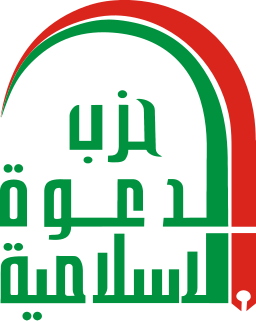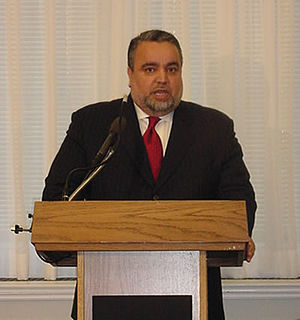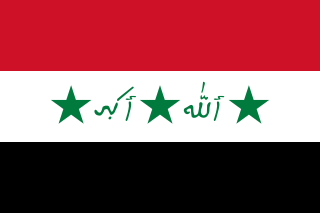The politics of Iraq take place in a framework of a federal parliamentary representative democratic republic. It is a multi-party system whereby the executive power is exercised by the Prime Minister of the Council of Ministers as the head of government, as well as the President of Iraq, and legislative power is vested in the Council of Representatives.

The Islamic Dawa Party, also known as the Islamic Call Party, is a Islamist political party in Iraq. Dawa and the Supreme Islamic Iraqi Council are two of the main parties in the religious-Shiite United Iraqi Alliance, which won a plurality of seats in both the provisional January 2005 Iraqi election and the longer-term December 2005 election. The party is led by Haider al-Abadi, who was the Prime Minister of Iraq from 8 September 2014 to October 2018. The party backed the Iranian Revolution and also Ayatollah Ruhollah Khomeini during the Iran–Iraq War and the group still receives financial support from Tehran despite ideological differences with the Islamic Republic.

The National Assembly is the unicameral legislature of Kuwait. The National Assembly meets in Kuwait City. Political parties are illegal in Kuwait, candidates run as independents. The National Assembly is made up of 50 elected members and 16 appointed government ministers.

Parliamentary elections were held in Iraq on 30 January 2005 to elect the new National Assembly, alongside governorate elections and a parliamentary election in Kurdistan Region. The 275-member legislature had been created under the Transitional Law during the international occupation. The newly elected body was given a mandate to write a new constitution and exercise legislative functions until the new constitution came into effect. The elections also led to the formation of the Iraqi Transitional Government.
Under the Iraqi constitution of 1925, Iraq was a constitutional monarchy, with a bicameral legislature consisting of an elected House of Representatives and an appointed Senate. The lower house was elected every four years by manhood suffrage. The first Parliament met in 1925. Ten general elections were held before the overthrow of the monarchy in 1958. The electoral system, however, was manipulated by the King and his advisors, who were Sunni Muslims, to ensure that the Shi'a majority were prevented from taking power.

The Council of Representatives is the unicameral legislature of the Republic of Iraq. As of 2020, it comprises 329 seats and meets in Baghdad inside the Green Zone.

Hajim Mahdi Saleh al-Hassani to a prominent family is an Iraqi politician and was the speaker of the Iraqi National Assembly under the Iraqi Transitional Government. A moderate Sunni Arab and relative outsider, having spent much of his life in the United States, al-Hassani was tapped as a compromise candidate for the speaker's post after weeks of deadlock between Iraqi political parties. al-Hassani had previously been a member of the Iraqi Islamic Party in exile and was Industry Minister under the interim government of Iyad Allawi.

The Iraqi Accord Front or Iraqi Accordance Front also known as Tawafuq is an Iraqi Sunni political coalition created on October 26, 2005 by the Iraqi Islamic Party to contest the December 2005 general election. As a large section of Iraq's Sunnis are composed by the populous Kurds, situated in northern Iraq and locally autonomous, the party's members are mostly Arab, and as such, its political efforts have largely been focused on protecting this community's interests as opposed to Iraq's non-Sunni population. In the 2005 election, its platform called for ending the US occupation of Iraq, revision of the new Iraqi constitution, repeal of the de-Ba'athification laws that had cost many Sunnis their government jobs and the restoration of the Iraqi Army, which was dissolved after the US overthrow of Saddam Hussein and which had a Sunni dominated officer corps. Despite this, the party has maintained that it is non-secular, even though the Ba'ath Party contained many prominent Sunnis.

Parliamentary elections were held in Iraq on 15 December 2005, following the approval of a new constitution in a referendum of 15 October.
The Iraqi National List was a coalition of Iraqi political parties who ran in the December 2005 Iraqi elections and got 8.0% of the vote and 25 out of 275 seats.
Adnan al-Dulaimi was a Sunni Iraqi politician who became prominent following the US invasion of Iraq in 2003 and the fall of the regime of Saddam Hussein. He and his supporters largely focused on two issues: ending the US occupation of Iraq; and strengthening and protecting the position of the country's Sunni-Arab minority at a time when the country's majority Shiite-Arabs have been in the political ascendancy.
Misha'an al-Juburi is an Iraqi politician from the Sunni Arab community and member of Al-Arabiya Coalition. He also was the head of Reconciliation and Liberation Bloc, which held three seats in the Iraqi Council of Representatives from 2005 to 2010. Juburi is the publisher of the al-Itijah al-Akhar newspaper and the owner of the Syrian-based Arrai TV. He is a Sheikh of the Al-Jiburi tribe, which is powerful in Salahuddin Governorate. As of 2016, he is a senior member of a parliamentary committee investigating official corruption.
Sectarian violence in Iraq refers to the violence that developed as a result of rising sectarian tensions between the different religious and ethnic groups of Iraq, most notably the conflict between the Shi'i Muslim majority and the Sunni Muslim minority within the country. With the creation of a modern nation-state, sectarian tensions arose slowly and eventually developed into recent violent conflicts such as the War in Iraq (2013–2017) and the Iraqi Civil War (2006–2008).

Governorate or provincial elections were held in Iraq on 31 January 2009, to replace the local councils in fourteen of the eighteen governorates of Iraq that were elected in the 2005 Iraqi governorate elections. 14,431 candidates, including 3,912 women, contested 440 seats. The candidates came from over 400 parties, 75% of which were newly formed.

Parliamentary elections were held in Iraq on 7 March 2010. The elections decided the 325 members of the Council of Representatives who would elect the prime minister and president. The elections resulted in a partial victory for the Iraqi National Movement, led by former Interim Prime Minister Ayad Allawi, which won 91 seats, making it the largest alliance in the Council. The State of Law Coalition, led by incumbent Prime Minister Nouri Al-Maliki, was the second largest grouping with 89 seats.

Ba'athist Iraq, formally the Iraqi Republic until 6 January 1992 and the Republic of Iraq thereafter, covers the national history of Iraq between 1968 and 2003, during the period of the Arab Socialist Ba'ath Party's rule. This period began with high economic growth and soaring prosperity, but ended with Iraq facing social, political, and economic stagnation. The average annual income decreased both because of external factors and the internal policies of the government.
The Al Anbar governorate election of 2013 was held on 20 June 2013 alongside elections for Nineveh.

Parliamentary elections were held in Iraq on 30 April 2014. The elections decided the 328 members of the Council of Representatives who will in turn elect the Iraqi President and Prime Minister.

Salim Abdullah al-Jabouri (Arabic: سليم عبدالله الجبوري) is an Iraqi politician who was elected as the Speaker of the Iraqi Parliament on 15 July 2014 until 1 July 2018.

Parliamentary elections were held in Iraq on 12 May 2018. The elections decided the 329 members of the Council of Representatives, the country's unicameral legislature, who in turn will elect the Iraqi President and Prime Minister. The Iraqi parliament ordered a manual recount of the results on 6 June 2018. On 10 June 2018, a storage site in Baghdad housing roughly half of the ballots from the May parliamentary election caught fire.











